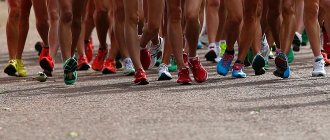For most people, running in the morning is the most affordable way to get a boost of energy for the whole coming day and keep your body in good shape. This sport does not require significant financial costs for the purchase of equipment and expensive subscriptions to the fitness center, and makes it possible to effectively lose weight and strengthen muscles.
Those who have been involved in sports for a long time are familiar with the rules for distributing the intensity of activities and loads. We advise beginners to practice morning jogging, especially if they have various types of diseases and excessive weight, only after consulting a trainer and a doctor. They will help you create a personal training plan.
How to run in the morning to feel energized
The effect of jogging is greatly influenced by the person’s condition. For early risers, getting up in the morning is not a significant problem, even if you have to get up an hour and a half earlier than usual.
For owls, whose vital activity occurs in the evening and night hours, and bedtime usually occurs well after midnight, early morning training can be a real challenge. The body does not have time to properly rest and is completely unprepared for intense exercise. If changing the schedule is impossible, do not torture yourself and put yourself in a state of stress. It is better to choose the most comfortable time for training, which optimally matches the rhythm of life.
Important advice! Before you start jogging, you need to stretch your joints and muscles to avoid sprains.
For beginners, a gradual and gentle system of exercises is recommended until the body gets used to the stress.
| Stage No. | Acceleration time or distance | Time relax | Pulse, beats/min |
| 1 | Warm up for 10 minutes | Walking about 800 m | 100-110 |
| 2 | 200 m or 1 min run | 130-150 | |
| 3 | 400 m at a calm pace | 100-110 | |
| 4 | 400 m or 2 min run | 130-150 | |
| 5 | 400 m at a calm pace | 100-110 | |
| 6 | Alternate jogging and rest 5-6 times | ||
| 7 | A few exercises to end your run | Walk 400-500 m | 100-110 |
To get the maximum effect from morning running and not to overload the body, it is advisable to adhere to general recommendations. At moderate intensity, positive changes will be felt after 2-3 months of regular training. To get an idea for beginners how to run properly in the morning, you should read the article at the link.
Pre-warm-up
Before you start jogging, you need to do a set of simple and dynamic exercises to warm up your joints and muscles and prepare them for the upcoming loads. Stretching is recommended for both beginners and experienced runners.
Before jogging, you need to do light joint exercises, then jog for a short time (5-10 minutes) to warm up your muscles. After this, you need to do a full warm-up for 10-12 minutes. During the warm-up you need to stretch your muscles. Spend 1-2 minutes on each exercise and do the exercises on both legs alternately. After completing your warm-up, you can begin your running workout.
Basic rules for morning jogging:
- follow the recommendations for preliminary warm-up and duration for beginners;
- try to maintain a moderate pace while moving, without sudden accelerations;
- monitor the level of pressure, pulse and body position;
- choose comfortable shoes and clothes for training that do not restrict movement and breathing. Try to avoid using things that create a greenhouse effect;
- after intense training, give the body a day to rest, avoid overwork;
- at the end of your morning run, do a few gentle muscle stretching exercises;
- After a run, you can take a contrast shower.
In addition to general recommendations, you should listen to the opinions of your doctor and sports coach, who will take into account individual characteristics and help you create the right training schedule.
Important advice! For those starting out running in the morning, a half-hour workout at moderate intensity will be enough.
Running technique
- You need to breathe through both your nose and mouth to saturate your lungs with oxygen.
- Keep a steady pace of running - the speed should be such that you can talk comfortably. The arms are half-bent (the angle at the elbow is about 90 degrees) and tense when moving forward, and relaxed when moving back. Hands move at the waist in synchronization with steps.
- The chest is turned out, avoid slouching.
- You need to run, lowering yourself onto the middle part of your foot, or, if this is still difficult, then step on your heel, smoothly rolling onto your toes. You cannot run by landing on your forefoot and toes.
If you experience pain in the muscles or joints, as well as general discomfort, you need to reduce the intensity of your training and consult a specialist. You may need individual recommendations to avoid overload and injury.
What if you don’t need to lose weight?
And if the question of whether it is possible to run in the morning on an empty stomach is relevant for those who want to lose weight, then what about those who do not want to lose weight, but run for health and to maintain muscle tone? It would seem that you can easily eat your fill. But it's not that simple.
If you have a hearty breakfast, it is also possible that you will most likely not feel like running at all. In addition, the body will be busy digesting food, and if at the same time you give it physical activity, it may not cope. You may feel unwell, heaviness, discomfort in the abdomen and many other negative consequences. Therefore, if you cannot run on an empty stomach, you can divide your breakfast into two parts: before the run, eat something light carbohydrate, and eat proteins and dense dishes after it.
To sum up, is it possible to eat before running in the morning, let’s highlight the following key points:
- If you want to lose weight, you don't need to have a full breakfast. Drink some drink, and eat your main food later.
- If your workouts are very intense, give your body a little fuel by consuming a small amount of carbohydrates before exercise.
- If you don’t plan to lose weight, then the best option is to divide a hearty breakfast into two parts: eat one before class, the second after.
What are the benefits of morning jogging?
Having decided to go jogging in the morning, first make sure there are no contraindications so as not to harm the body. Individual recommendations will allow you to achieve maximum effect.
Running is useful because it gives a person:
- the ability to lose excess weight and improve overall body tone;
- a surge of endorphins that helps normalize sleep;
- increasing endurance and strengthening the heart muscle due to regular training;
- strengthening the immune system by increasing the content of hemoglobin and red blood cells in the blood;
- improvement of skin condition;
- stabilization of pressure and respiratory organs, shortness of breath stops;
- increase in overall performance;
- activation of brain activity due to an intense rush of oxygen-enriched blood.
It is better to conduct classes in parks, squares, along the embankment, in places with clean air, away from heavy traffic, to minimize the entry of exhaust gases into the lungs.
How not to eat and not get hungry
The body can be tricked a little. Try rinsing your mouth with a carbohydrate or protein drink without swallowing it. The brain can calm down, believing that the food has arrived.
If your stomach can only tolerate small amounts of food, try eating carbohydrate gels or bars while running. Perhaps the nutritional properties will not have time to take effect, but the body will consider that there is no point in maintaining a backup copy of energy, because a new batch has arrived. You will feel a surge of strength.
What changes occur in men and women who start running regularly in the morning?
It is also worth mentioning the reaction of the female and male body to constant exercise.
The benefits of running in the morning for the fair sex:
- The happiness hormone is produced, which guarantees an elevated mood throughout the day, will help withstand stressful situations and reduce the craving for sweets;
- Intense exercise promotes blood circulation, which has a positive effect on oxygen saturation and cell renewal. The face acquires a healthy glow, the skin becomes elastic and toned;
- Rejuvenation of the reproductive system of the body, thanks to the flow of blood into the pelvic organs. Jogging is also recommended for women on the eve of and at the onset of menopause. Loads allow the body to rebuild faster;
- The body acquires slender shape and elasticity, muscles are tightened evenly throughout the body, thanks to the distributed load;
- Self-esteem and self-confidence increases, especially if training becomes regular.
For the stronger half of humanity, morning running contributes, in addition to the positive factors listed above, to the production of hormones that affect potency. Increased testosterone levels, decreased fat mass and increased blood circulation enhance sexual desire and erectile function.
Strengthening the walls of blood vessels prevents early impotence and coronary diseases.
Saturation of blood with oxygen promotes the active functioning of areas of the brain responsible for libido.
Important advice! It is advisable to start your morning run slowly, gradually increasing the pace.
The effect of running on an empty stomach on the body
Despite all the above facts, running on an empty stomach has a fairly strong effect on the body as a whole. First, it increases sensitivity to insulin, the hormone responsible for redirecting sugar to the muscles for energy. This hormone is released during meals, so frequent snacking leads to the body becoming more resistant to insulin. Which, in turn, causes weight gain.
Secondly, while jogging on an empty stomach, growth hormone levels increase. Thanks to it, the body builds muscle mass and accelerates the process of strengthening bone tissue.
Photo: istockphoto.com
Before you begin such training, it is important to remember that running on an empty stomach is difficult. After the first kilometers, you may feel discomfort in your abdominal muscles. There may also be minor pain and a slight burning sensation in the diaphragm area. In addition, it is worth remembering that immediately after training it is better to refrain from eating food. It is recommended to drink another glass of water and only after an hour have a full meal, excluding fatty foods. And last but not least, don’t forget to warm up before starting any workout. By following all these rules, you will go for runs much more often and finish them in a good mood and well-being.
In the heart of the capital: scenic routes for jogging in autumn
Who should avoid morning jogging?
Despite the many positive factors of morning jogging, in some cases doctors recommend refraining from training. Intense exercise is contraindicated at any time of the day:
- with diagnosed glaucoma;
- women who are four months or more pregnant;
- for diseases of the cardiovascular system, as well as those who have suffered a stroke or heart attack;
- suffering from dysfunctions of the musculoskeletal system, in the presence of intervertebral hernias;
- during the active stage of infectious diseases;
- after surgery or injury, until the body is completely restored;
- for serious pathologies of internal organs, liver, kidney disease, etc.
There are other contraindications in which you should refrain from morning jogging. In order not to harm your health, it is better to consult a doctor and undergo an examination.
Doctors often recommend running in the morning to patients with various diseases as a preventive measure for overall strengthening of the body.
Should you eat breakfast before running in the morning?
It is better to have breakfast after a run, and 20-30 minutes before the morning run, drink water and have a small snack with fast carbohydrates: a banana, an energy bar, white bread with jam, a sports drink or gel will do. Foods high in fiber or fat are not suitable - they can cause stomach upset while running.
Eat in the morning depending on the duration of your workout. Short morning runs can be done on an empty stomach if you eat a hearty meal in the evening. A long workout requires more energy, so it is better to have a snack in the morning before running or take a sports gel with you. Try different pre-workout meal options and find what suits your stomach.
How morning running helps with weight loss
Many novice athletes complain that they have been engaged in intense sports exercises for 1-2 months, but the hated kilograms do not go away. In order to achieve not only a general health effect on the body, but also to lose weight, it is necessary to take into account a number of rules.
During the first 35-40 minutes from the start of training, glycogen is burned in the body and, as such, a decrease in body weight does not occur. The fat begins to “melt” in the next 15-20 minutes. Therefore, the desired effect occurs if the total training time is at least one hour. For beginners, it is better not to exceed the recommended intensity and stick to a regime that is comfortable for the body.
Progress is impossible without periodic rest; muscles and joints must recover. After 2-3 months of training, if there are no contraindications, you can gradually increase the intensity, alternating jogging with cross-country runs lasting 1 hour or more. There should be no more than 2 training sessions with increased load per week.
Running over rough terrain for 1-1.5 hours gives a good effect, but this requires some physical preparation. The maximum number of calories is burned during interval running, when cross-country on flat areas alternates with acceleration uphill.
Don't forget to monitor your pulse and proper breathing. Aerobic exercise is more effective when your heart rate is within the specified limits. Therefore, a heart rate monitor will be useful for training, which will allow you to check your heart rate while running and adjust your speed relative to your heart rate.
Much attention should be paid to the choice of shoes. If you are overweight, choose sneakers that have additional cushioning. When training, the main thing is not to damage your joints, otherwise your dreams of quickly losing weight will have to be postponed.
Morning jogging, like any other sport, has a positive effect. Of course, it’s hard to force yourself to get up early and move from a warm bed to the street, where it’s drizzling or the wind is blowing. But if you manage to withstand one and a half to two months, when, according to statistics, the body undergoes restructuring and adaptation, changes will not keep you waiting. It is only important to adhere to the rules, not to try to quickly reach the top of sports, and to listen to the opinions of doctors and sports mentors.
What can you eat before a running workout?
To prevent you from feeling sick while jogging, be sure to drink 200-250 ml of water before training. And besides, it is important not to wait for the first signs of dehydration to appear: dry mouth and dizziness. To do this, take a small bottle of water with you and drink during class.
Vladimir:
It is imperative to remember that the last meal should be 1.5-2 hours before sports. Try not to eat foods that are difficult to digest: red meat, fatty foods. Porridge with fruit, eggs, and light sandwiches on whole grain bread are good options. If you're planning a monotonous running workout, you may want to avoid eating before it.
Photo: istockphoto.com
Running rules. 5 mistakes beginners make
Best posts about running
- How to start running - running tips for beginners, recommendations and common mistakes of beginning runners
- How to breathe correctly when running - breathing technique during training
- What does long-distance running develop?
- How many calories are burned when running and how long should you run to lose weight?
- My side hurts when running – should I worry?
- Is knee pain after running a sign of a serious illness?
Sports nutrition scheme
A comprehensive sports nutrition diet includes mandatory and optional dietary supplements. They allow you to quickly get rid of extra pounds and strengthen muscles.
It is recommended to adhere to the following scheme:
- Fat burners. Increases calorie absorption and training effect. Reception begins with 2 capsules per day and is gradually increased to 4. You can take up to 8 weeks. Then you need to take a break.
- L-carnitine. Compensates for fatigue and increases endurance. Removes fat from the bloodstream, turning it into useful energy. Take 1-2 times a day, on an empty stomach.
- BCAA - amino acids that prevent dehydration, preserve muscle mass and suppress appetite while maintaining endurance. Take 2 tablets before training or immediately after.
- Protein mixtures. They contain slow protein, which prevents the body from replenishing calories from muscles. Can be taken 3-4 times a day before training or when there is a strong feeling of hunger.
- Vitamin and mineral supplements. When losing weight, there is a deficiency of nutrients, because a limited range of products is consumed. Supplements that relate to sports nutrition take into account the body’s increased need for vitamins and minerals after physical activity. 1 capsule per day is enough.
Why is this happening?
If you jog for 10-20 minutes, then you are unlikely to lose weight. With such a load, the muscles are fueled by sugar from the liver - glycogen. Its reserves last for about half an hour, and then the body switches to another source of energy - fat cells.
Therefore, in order to lose weight, you need to run for at least an hour.
However, you shouldn’t overdo it either: since fats are broken down slowly, the body begins to take energy from proteins, as a result of which muscle mass is lost.
So, we have realized that losing weight by running is not only possible, but also necessary. All that remains is to figure out how to run to lose weight. To do this, you need to follow certain rules that will help make your workouts as useful and enjoyable as possible.
Does running really make you lose weight?
To answer this question, let's look at what happens to the body when we begin to train intensely. The additional workload is a serious stress for him. He is forced to expend more energy than usual, and to compensate for it, he speeds up his metabolism. A chain of chemical reactions is launched in the body, converting not only “freshly consumed” calories into energy, but also those stored in reserve. This results in the effect of quickly losing a certain number of kilograms in the first weeks of training.
But the body cannot be constantly under stress. Over time, he adapts to the additional load and already perceives it as the norm. It becomes easier for you to run, and you spend less and less calories on the same run. As a result, the weight stops coming off. To speed up metabolism again, the body must receive a new shock in the form of a more intense load. Therefore, if you hope that your extra pounds will melt away only from jogging, we hasten to disappoint you - this method will not work.
Wake up motivated
We all dream of easily waking up early in the morning, putting on our favorite bright sneakers and enjoying clean air during our next run (and, of course, we run regularly). The night before bed, many even prepare their clothes for an early workout. But, unfortunately, not everyone gets out of a warm and cozy bed in the morning. Of course, we are always looking for excuses and justifications: it’s too cold outside, I went to bed late, there’s still so much time before summer, I’ll run tomorrow, Masha didn’t run, and then I’ll sleep too. But there are two important concepts that can make you overcome laziness and leave a warm blanket and pillow: motivation and purpose.
Motivate yourself, try to become an example for other people. There is nothing wrong with following sports updates on social networks and Instagram, as well as sharing your successes. Set yourself a clear goal (not a dream, but an achievable goal), for example: in three months I want to run a half marathon and tone my body . Write down this goal, attend fitness events, use mobile applications that will remind you of your goal, find a trainer and exercise regularly. And every morning before jogging, keep an image of your own ideal body in your head. By spending 40 minutes running in the morning, you are one step closer to your goal.











